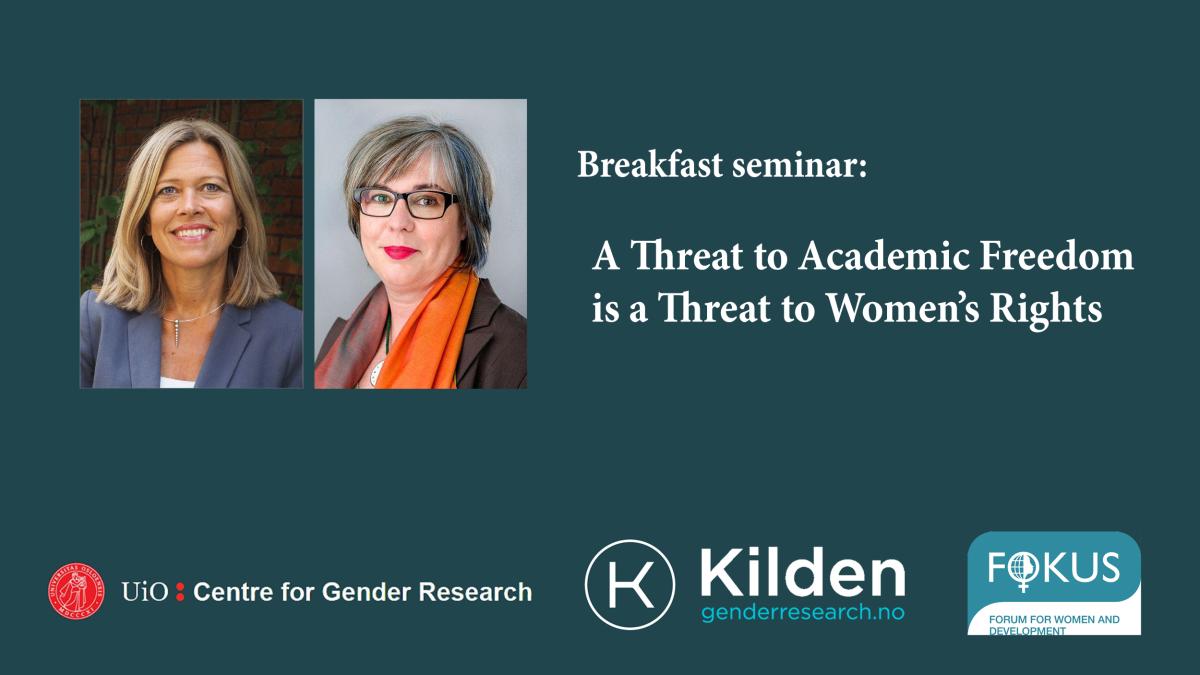A threat to academic freedom is a threat to women's rights

Time: 15 November 8 AM–10 AM
Place: The House of Literature, Oslo - Kverneland
Please register here.
In Hungary, the authorities have recently banned gender studies. There is now a growing concern for the violation of fields of study that challenge the ideology of right-wing populist governments. Globally, an increasing number of states attack democratic values such as freedom of expression and researchers' possibility to do autonomous research. These regimes all want to restore conservative family ideologies, and consequently diminish women's rights and the development towards gender equality.
In this seminar, we invite scholars, civil society representatives and academic institutions to discuss these international challenges, as well as Norway's role and responsibility as co-operating and funding stakeholders.
We ask:
- What is happening to academic freedom and gender studies in Europe now?
- What is the global situation concerning academic freedom, funding of research and the possibility to run autonomous research institutions?
- Why is academic freedom crucial to the protection of and strengthening of gender equality and women's rights?
- What responsibility do research institutions cooperating within countries opposing researchers' autonomy have?
- What is the responsibility of funding bodies, such as the Research Council of Norway, to support and strengthen critical gender research in co-operating countries?
Program
8.00: Breakfast
8.30: A threat to academic freedom is a threat to women's rights: Seminar on the current state of gender research in Europe and beyond
Andrea Petö, Professor at the Department of Gender Studies at Central European University, Budapest, Hungary
Attack on Freedom of Education in Hungary. The case of gender studies
In early August 2018, when Budapest usually suffocates in a heatwave, and most educational institutions are closed for holidays, members of the Hungarian Rector’s Conference received a seemingly innocent email from the Ministry of Human Capacities (which includes a secretariat for education) asking them to comment on a draft decree by the evening of the next day. The less than 24 hours deadline during vacation season should have been enough to raise alarm bells. But the real issue was hidden in the title of the draft decree on the modification of other decrees concerning “the training and outcome requirements of vocational-, Bachelor- and Masters-level educational programs, and the joint requirements of teacher preparation and the training and outcome requirements of various teacher training programs.”
After a closer look, readers of the bulky document discovered that in the Sub-chapter 16 the draft decree laconically declared that all permissions given to the “Masters-program in gender studies” were simply revoked.
In her talk, Peto will provide valuable insight into the situation for gender research and academic freedom in Hungary.
Benedicte Bull, Professor at SUM Centre for Development and the Environment, University of Oslo
Populism and the threat to academic freedom and gender rights in Latin America
On 1 November, the Brazilian Supreme Court issued a decision that overturned decisions by electoral court judges who recently ordered universities across the country to clamp down on what they considered illegal political campaigning.
Examples of such “illegal political campaigning” include a banner at the Rio de Janeiro State University honoring the black, lesbian activist and politician Marielle Franco that was brutally murdered in March this year. In the middle of the electoral campaign, public events and banners against fascism were ordered suspended or removed by court officials arguing that they expressed support for the now president elect: Jair Bolsonaro. He and his allies push a bill that would prohibit teachers from promoting their own opinions in the classroom or using the terms “gender” or “sexual orientation,” and would order that sex and religious education be framed around “family values".
This is not the first time that the campaign against “gender ideology” and issues related to gender equality and the rights of sexual minorities have taken center stage in political campaigns of populist and authoritarian forces in Latin America that also seek to restrict academic freedom and freedom of expression. In her talk, Bull will discuss why this has been the case, what can be the consequences and what examples we have of good strategies to resist it.
Panel discussion with/
- Gro Lindstad, Executive director FOKUS - Forum for Women and Development
- Kristin Danielsen, Executive Director for Internationalization, The Research Council of Norway
- Mari Sundli Tveit, Rector, Norwegian University of Life Sciences and Leader of the Board, Universities Norway (UHR)
- Andrea Petö, Professor Department of Gender Studies at Central European University, Hungary
- Benedicte Bull, Professor SUM Centre for Development and the Environment, UiO
- Moderator: Mari Lilleslåtten, Journalist Kilden genderresearch.no (kjønnsforskning.no)
Welcome!
Express your interest on facebook, and please register here.
Organisers: FOKUS - Forum for Women and Development, Centre for Gender Research at the University of Oslo and Kilden genderresearch.no.